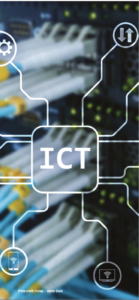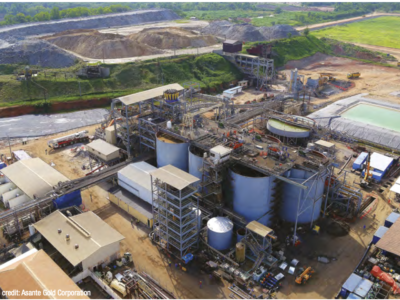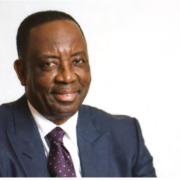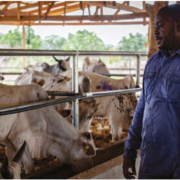Ghana’s Information Communication Technology sector is one of the fastest growing in the economy, with a knock on effect on other sectors. It is anticipated to
expand substantially, reaching $5 billion by 2030. The ICT landscape encompasses various stakeholders, including telecommunication service providers, internet service providers, software developers, and training institutions. Regulation of the sector is overseen primarily by the Ministry of Communications and Digitalisation, along with the National Communication Authority (NCA), supported by other regulatory bodies.
Ghana has three main mobile network operators: MTN, AirtelTigo, and Tel- ecel, which entered the market in 2024 by acquiring Vodafone’s Ghana op- eration. MTN leads the market with ap- proximately 67.32 percent market share, followed by Telecel with 18.17 percent percent. As of January 2023, Ghana had 39,812,171 mobile voice subscribers and 23.05 million internet users, represent- ing a penetration rate of 68.2 percent.
There are five primary BWA operators in Ghana, which play a crucial role in providing high-speed internet services across the country. The country has 137 licensed television networks, reflecting a diverse media landscape, and 684 radio stations, indicating a broad and varied auditory media presence.
The fintech sector is growing rapidly, with over 40 companies contributing to the digital financial services ecosystem. This growth is significantly driven by mobile money services, where Ghana is a leader in the region. There are over 600 IT companies operating in Ghana, pro- viding a range of services from software development to IT consulting.
Ghana’s ICT sector continues to be a sig- nificant driver of economic growth and innovation. The government is actively promoting digital initiatives, such as the National ID system, digital address systems, and the expansion of fibre optic networks. The mobile network operators in Ghana are also making substantial investments to enhance the adoption of advanced mobile services. These efforts aim to enhance connectiv- ity, especially in rural areas, and support the growth of a digital economy. The ICT sector is expected to grow from its 2022 value of $1 billion to an estimated $5 billion by 2030, reflecting robust in- vestment and development within the sector.
The fintech subsector has emerged as one of the most significant drivers of growth, characterised by a dynamic in- terplay between mobile network opera- tors (MNOs), financial institutions, and regulatory bodies. The Bank of Ghana plays a crucial role by providing banking licences to banks that act as super agents for the MNOs in the mobile money market. These banks and super agents ensure liquidity, facilitating cash-in and cash-out transactions, while MNOs manage the mobile wallets of their su- per agents. The MNOs, serving as both agents and partners with the banks, pro- vide the technological platforms neces- sary for cash receipt and transfer.
In 2023, the total value of mobile money transactions in Ghana reached a record level, soaring to GHS 1.912 trillion. This significant milestone, as revealed in the January 2024 Summary of Economic and Financial Data by the Bank of Gha- na, marked a substantial increase from GHS 1.07 trillion in 2022. This growth underscores the rapid adoption and increasing reliance on mobile financial services in the country, driven by factors such as greater financial inclusion, ad- vancements in mobile technology, and an expanding network of mobile money agents.
In 2020, the National Communications Authority (NCA) classified MTN as a significant market player due to its sub- stantial market share, which surpassed the regulated threshold while its com- petitors’ shares lagged significantly. This classification was aimed at introducing measures to foster a more competitive environment, allowing rival operators to better compete with MTN.
Additionally, the African Continental Free Trade Agreement (AfCFTA) is set to enhance market access to neigh- bouring countries, further boosting economic activities. The introduction of the Pan-African Payment and Settle- ment System (PAPSS) will facilitate the efficient and secure flow of money across African borders. This develop- ment is expected to increase demand for e-commerce and e-money-related transactions in Ghana, complementing the competitive measures implemented by the NCA to balance the market dy- namics among telecom operators.
• Investing in data centre deployment and management, business continuity, and information security to support in- stitutions such as pension funds, banks, brokerage houses, and insurance firms. • Last-mile connectivity, to bring connectivity to the end users in under- served communities.
• Taking advantage of the Geneva 2006 (GE06) Agreement, which estab- lished the Digital Terrestrial Broadcast- ing Plan and to which Ghana is a signa- tory, to deliver terrestrial services.
• Supporting the government of Gha- na to deliver on its digitisation agenda and provide digital administrative ser- vices.
INVESTMENT INCENTIVES
• Investors in the sector benefit from seven year tax exemption, relief from double taxation for foreign investors and employees, and the ability to carry forward tax losses for up to five years.
• Ghana’s enhanced internet infra- structure is driving down access costs, boosting data penetration, and paving the way for technology convergence.
• The sector is well regulated as it is linked with the financial industry and prioritises stringent data protection measures.
• The e-Transform Ghana Project, which aims to revolutionise govern- ment service delivery by implementing interventions that leverage information technologies like Wide Area Networks (WAN), the internet, and mobile com- puting, provides more opportunities for investors in the sector.
















Comments